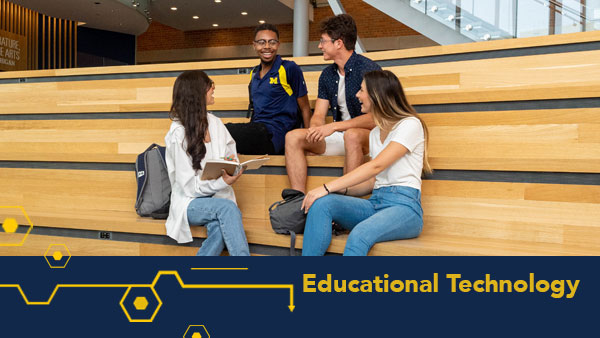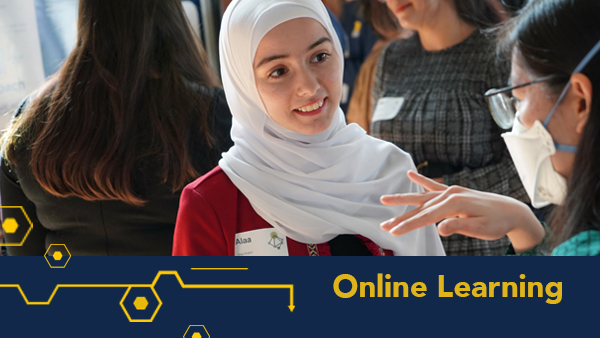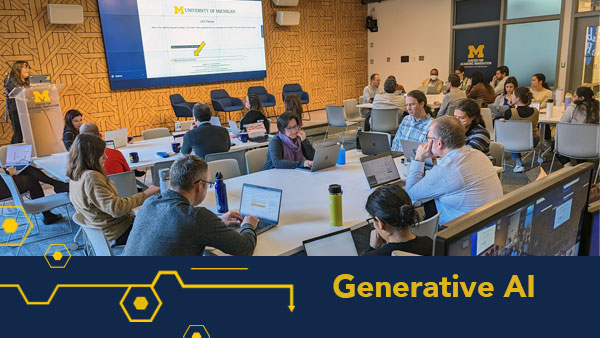Sarah Moncada, Academic Innovation Initiative Project Coordinator
@scsutter
The Simulations Community of Practice is an interdisciplinary group of U-M staff and faculty who meet regularly to discuss the development and implementation of simulation-based teaching tools. Participants explore the benefits and challenges of simulation activities, as well as share experiences and resources.
This community of practice developed out of an open, informal conversation on simulation pedagogies hosted by the Office of Academic Innovation in March 2017. The conversation generated an abundance of questions, concerns and recommendations about the use of simulations in teaching, and participants expressed interested in having ongoing, more in-depth discussions. Since then, the group has met several times to examine a range of topics, including simulation types, facilitation best practices, learning goals and debrief techniques.
Meetings will continue in the 2017-2018 academic year. The Simulations Community of Practice is kicking off the semester with a session on Wednesday, September 27 from 1 – 2 p.m. at the Office of Academic Innovation (8th Floor, Hatcher Graduate Library South). At this gathering, participants will discuss the special considerations needed for planning, facilitating and debriefing simulation activities that involve sensitive topics or contexts.
We welcome all instructors and staff who create and/or facilitate simulation activities for the classroom, or who are interested in doing so, to join our group. Please email me, Sarah Moncada ([email protected]), if you would like to be added to the email list.
Here is a brief overview of the group’s activities to date:
Initial Gathering at Innovation Hour
 Faculty and staff from a range of units, including Public Policy, Nursing, Medicine, Education, Information, Engineering, ITS and Academic Innovation, convened for an informal conversation about simulation activities and pedagogies. Participants gained a sense of the tremendous range of simulations that take place at U-M, from the use of chicken skin as a simulation for cutaneous surgery to a customized digital platform for simulating multi-role government policy decisions.
Faculty and staff from a range of units, including Public Policy, Nursing, Medicine, Education, Information, Engineering, ITS and Academic Innovation, convened for an informal conversation about simulation activities and pedagogies. Participants gained a sense of the tremendous range of simulations that take place at U-M, from the use of chicken skin as a simulation for cutaneous surgery to a customized digital platform for simulating multi-role government policy decisions.
Despite the diversity of activities, disciplines and technologies, attendees agreed on what drives their use of simulations. Several noted the value of simulations as safe spaces where students can make and learn from mistakes. Students can experiment with their decisions and approaches in hands-on environments. Learners’ active engagement–especially when combined with post-simulation debrief or reflection activities–leads to a deeper understanding of systems, processes and skills.
There was also consensus among practitioners about the challenges of education-based simulation activities. Many commented on the special difficulties of evaluating student learning in these instructional contexts, as well as the challenge of managing the open-endedness or variability inherent to many simulations. Attendees expressed a desire to develop a greater understanding of simulation-related tools and activities from other disciplines, noting that U-M simulation designers and facilitators ought to come together to discuss best practices and necessary skills for conducting simulations responsibly and effectively.
Community of Practice: First Steps
 At the first meeting of the Community of Practice, attendees began by compiling a list of simulation activities that take place at U-M. Again there was a wide range, from small-group lean manufacturing paper-cutting simulations in the College of Engineering to large-scale empathy-building poverty simulations hosted by the Sociology Department and the School of Public Health.
At the first meeting of the Community of Practice, attendees began by compiling a list of simulation activities that take place at U-M. Again there was a wide range, from small-group lean manufacturing paper-cutting simulations in the College of Engineering to large-scale empathy-building poverty simulations hosted by the Sociology Department and the School of Public Health.
In an attempt to assign these activities to categories or types, it became clear that individuals from different fields use different terminology to describe simulations and have contrasting understandings of what constitutes a simulation. The group then discussed distinctions, posing questions to each other such as, “What differentiates a simulation from a case study?” and “Do simulations always involve role-playing?” Several agreed that simulations involve collective decision-making of some kind, and that there must be a variable outcome–participants’ decisions within the simulation will change the experience and results.
Demo of PolicyMaker
 At the community’s June gathering, Dr. Elisabeth Gerber , Jack L. Walker, Jr. Collegiate Professor of Public Policy in the Ford School of Public Policy, facilitated a demo of PolicyMaker, a digital platform for creating and implementing customized, interactive role-playing simulations. Gerber walked through the different functionalities of the tool from an instructor perspective, including how to create and manage a simulation scenario, assign roles to participants, and navigate within the platform.
At the community’s June gathering, Dr. Elisabeth Gerber , Jack L. Walker, Jr. Collegiate Professor of Public Policy in the Ford School of Public Policy, facilitated a demo of PolicyMaker, a digital platform for creating and implementing customized, interactive role-playing simulations. Gerber walked through the different functionalities of the tool from an instructor perspective, including how to create and manage a simulation scenario, assign roles to participants, and navigate within the platform.
Attendees of the demo were assigned participant roles within one of Gerber’s public policy scenarios to get a feel for how students might use the tool in an educational context. PolicyMaker is designed to facilitate and enhance an in-person simulation experience. The platform contains profile pages for students to learn about their roles, messaging functions to communicate with other participants, calendars and voting tools to organize actions and decisions within the simulation, and a “news feed” to view outcomes and updates. All these features support the engaged, face-to-face interactions that take place in the classroom during a simulation.
The demo closed with a conversation about the potential use cases for PolicyMaker and the flexibility of the tool to work with a variety of scenarios and learning goals. Gerber encouraged participants to think about how the digital platform might operate in different academic domains and contexts. For more details, check out Michigan Daily reporter Nisa Khan’s feature on the PolicyMaker demo session.
Learning Goals and Debrief Techniques
 By the final meeting of the summer, the Simulations Community of Practice had grown to include representatives from U-M Libraries, the LSA National Center for Institutional Diversity, the Taubman School of Architecture and Urban Planning, and Ross School of Business, as well as faculty and staff from U-M’s Dearborn campus and Michigan State University.
By the final meeting of the summer, the Simulations Community of Practice had grown to include representatives from U-M Libraries, the LSA National Center for Institutional Diversity, the Taubman School of Architecture and Urban Planning, and Ross School of Business, as well as faculty and staff from U-M’s Dearborn campus and Michigan State University.
The meeting opened with acknowledgement that a well-facilitated debrief session is the most instructive part of a simulation. It is important for students to have an opportunity to review, discuss, and reflect upon the simulation experience after it is over. In order to design effective debrief activities, facilitators must have a grasp of their learning goals and expectations for the simulation.
Dr. Rachel Niemer, Director of the Gameful Learning Lab, noted that learning goals for simulations can vary widely. For example, the learning goals of a healthcare simulation, in which medical students are acting as doctors and performing simulated versions of tasks they will carry out in their professional lives are quite different from those of a poverty simulation, participants are intentionally placed in unfamiliar positions and situations as they navigate low-income challenges. These simulations would therefore require different debrief activities.
Others in attendance agreed, adding that it is important to identify whether the simulation has learning goals related to mastery learning and skill development or whether the primary focus is on empathy-building or social experience. In mastery-based healthcare simulations, the debrief may need to be immediate and action-oriented, whereas with empathy-building social simulations the participants may need time to “cool down” and process before an open-ended debrief conversation about participants’ reactions and key takeaways.
What’s Next?
The Simulations Community of Practice will be starting the school year with the September 27 discussion of special considerations for simulations involving sensitive topics or contexts.
Additional meetings this fall will focus on topics such as ways to effectively describe expectations to students and consideration of participants’ social identities when assigning roles and facilitating role-playing simulations. Be sure to check out our events page for details about upcoming gatherings of the Simulations Community of Practice.


